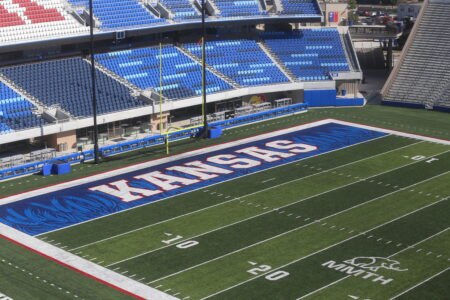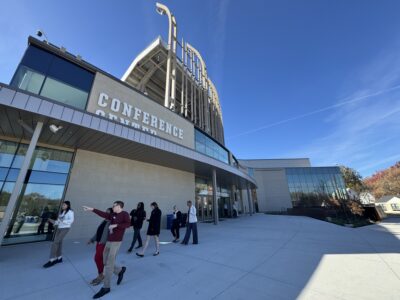KU seeking to create program to give some private apartment complexes a leg up in landing students
KU also seeking approval to increase on-campus housing, dining rates

photo by: Nick Krug/Journal-World
An aerial image shows Daisy Hill on July 15, 2015.
The University of Kansas wants to start giving its seal of approval to private apartment complexes in Lawrence, if they meet certain standards set by KU.
KU leaders will seek approval from the Kansas Board of Regents this week to create an “affiliated housing plan” for the university. The affiliation plan would involve private apartment complexes in Lawrence getting special promotion from KU, as long as the university deems the apartments are run and maintained in a manner suitable for KU students.
In a memo to to the Regents, KU leaders said such a program makes sense because “thousands of off-campus students likely need guidance and support as new adults finding their way within the local communities’ marketplaces.” The memo also states that an increasing number of students and their families expect KU to assist in finding off student housing, given that the number of students at the university far exceeds the number of on-campus student housing units.
Details about how the program will work, and what apartment complexes must do to qualify for an affiliation with the university weren’t spelled out in the information provided to the Regents. The memo does state that affiliated properties would meet “high standards of safety, quality, proximity to campus, and student support.”
The memo also says affiliated properties will be “purpose-built housing environments for university population and support the overall university experience.” The memo doesn’t provide information on whether the apartment complexes will have to pay a fee to be affiliated with the university.
Complexes that affiliate with the university likely will be able to legally restrict residency at the complex to tenants who are somehow affiliated with the university, the memo states.
KU has dipped its toe into such a program in recent years. In 2024 KU entered into a partnership with the apartment listing company Rent College Pads. That partnership provides rental listings targeted to KU students.
The new affiliation program will create more formal links between the apartment complexes and KU itself, according to information provided to the Regents. The partnership, though, will be structured so that KU won’t have any legal liability for any affiliation with an apartment complex, according to the memo.
“The university makes no guarantees regarding the financial stability or management of any affiliated property,” Regents are told in the memo.
The affiliation program comes at a time when KU has struggled to meet student demand for on-campus housing as enrollment levels have set new records the last two years. KU’s student housing department has leased all of the privately-owned Naismith Hall property at 19th Street and Naismith Drive. The department also is leasing multiple floors in the HERE apartment complex that is across the street from KU’s football stadium.
Separately, the KU Endowment Association last year purchased the Hawker apartment complex at 1011 Missouri Street to help KU meet its student housing needs. As part of the Gateway District project that is renovating the area around David Booth Kansas Memorial Stadium, a private development firm plans to build approximately 400 beds of student housing just east of the stadium.
The idea also comes at a time when some new apartment projects are underway or in the works near the KU campus. Construction work has started on a new apartment project near the intersection of Ninth and Avalon on the former university-owned property that used to house the film production facility known as Oldfather Studios.
Additionally, Lawrence developer Doug Compton — who is leading the Oldfather project — is going through the rezoning process for a piece of property on the eastern edge of the KU campus. Last month, the Lawrence-Douglas County Planning Commission gave preliminary approval for the properties at 1430 an 1432 Ohio Street to be rezoned to a “very high density” zoning category. If given final approval, the rezoning would clear the way for new apartment development on the properties, which are just a couple of blocks from the main KU campus.
Regents will consider approving the affiliation program at their Wednesday meeting. The item is on the board’s consent agenda, which is reserved for items that are expected to receive routine approval.
The Regents also will take up a more traditional student housing item at Wednesday’s meeting. KU and other other universities are seeking preliminary approval to increase on-campus housing and dining rates for the next school year.
KU is seeking the largest increase among the state’s six Regents universities. The price for a modest two-person room and a limited dining plan would increase by $566 for the year or 4.9%.
In its request to Regents, KU officials said the increase is needed to maintain an adequate reserve fund for the housing operations and to address numerous deferred maintenance projects that have risen to the level of critical needs.
Major projects that are planned for this year and next include foundation repair at Watkins scholarship hall, elevator repairs at Ellsworth and Hashinger halls, and fire alarm repairs at Lewis and Templin halls.
Here’s a look at at the proposed annual rates for a modest two-person dorm room and limited dining plan at each of the Regents universities.
• KU: $11,904, up 4.9%
• Pittsburg State: $9,770, up 4.8%
• Fort Hays State: $9,725, up 4.5%
• Kansas State: $10,700, up 1.7%
• Wichita State: $12,100, up 1.6%
• Emporia State: $10,500, unchanged.
Emporia State’s proposal results in unchanged rates for modest two-person dorm rooms, but will include a 7% to 10% rate decrease for some of its newest rooms. The decreases are part of a revamping of the university’s business model that is attempting to lower student costs by finding efficiencies elsewhere on campus, including the controversial elimination of some programs and faculty.
Regents will receive the rate proposals at Wednesday’s meeting, but won’t vote on the requests. The soonest the Regents would approve rates would be at their December meeting.






